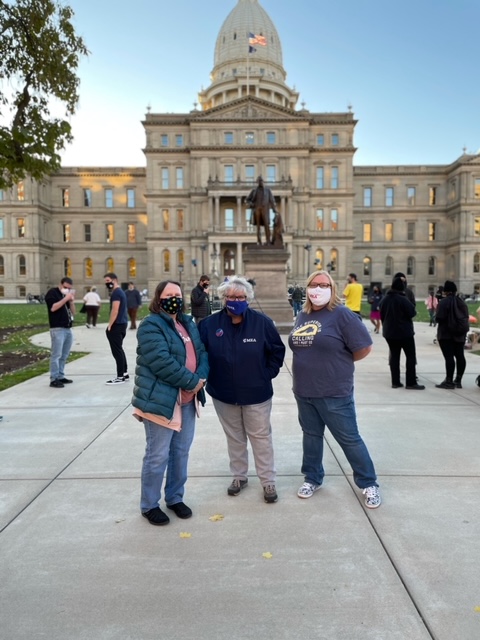Analysis: Where We Stand, Post Election and Mid-Pandemic
By Brenda Ortega
MEA Voice Editor
MEA members’ hard work to elect friends of public education up and down the November 3 General Election ballot paid off in many ways, but one of the most significant and least ballyhooed wins came in the state Supreme Court race.

With much of the post-election news focused on President Donald Trump’s refusal to concede in his decisive loss to former Vice President Joe Biden, wins by two MEA-recommended Supreme Court candidates drew little media attention.
The re-election of Chief Justice Bridget Mary McCormack and the first-time election of Grand Rapids-area employment law attorney Elizabeth Welch swung control of the court for the first time in a decade.
The current-events context is important to note.
One month before the election, a 4-3 conservative majority on the state’s highest court ruled in favor of Republican lawmakers who sought to strip Gov. Gretchen Whitmer of emergency powers to issue orders related to the coronavirus crisis.
The narrow ruling struck down Whitmer’s executive orders protecting public health amid the COVID-19 pandemic, including requirements for mask-wearing in public places. Within a week, the Michigan Department of Health and Human Services (MDHHS) and local health departments began issuing orders under their own separate authorities.
However, the high court’s decision sowed confusion and stirred backlash by mask opponents, and many observers have said the change in authorizing of public health rules and requirements deepened partisan divides over common-sense tools for slowing the spread of the virus.
As of press time for this issue, the Legislature had done little to bridge the divide or step into the breach in public opinion regarding masking and social distancing rules.
The failure of lawmakers to act continued even as COVID-19 infections and hospitalizations in Michigan began a precipitous rise in early to mid-November, as health officials had long warned could happen with the arrival of colder weather if public health measures were not followed.

Herbart poses with member paraeducators from Mason, April Switerberg and Maurene Barker, at a #CountEveryVote rally in Lansing.
In late October, MEA President Paula Herbart issued a statement and appeared in newspaper, radio and television interviews on the subject—joining a chorus of education, health, and business leaders calling for state lawmakers to take action.
“It is now a matter of life and death for the leaders of this state to work together to promote the use of masks and physical distancing, which we know reduce exposure and save thousands of lives,” Herbart said.
When the leadership of the House and Senate left for an extended hunting break on Nov. 12 without acting on a mask bill, Sen. Dayna Polehanki, (D-Livonia)—an English teacher and MEA member who first won her seat in 2018—called them out in a pointed floor speech.
“There appears to be no effort by the majority party to consider mask legislation or any other COVID legislation, for that matter,” Polehanki said. “To my colleagues across the aisle, you wanted this responsibility, so do something. Michiganders deserve better than this.”
Three days later, the Detroit Free Press editorial board similarly called for legislative action, noting in a Sunday, Nov. 15 commentary that “Whitmer’s proactive leadership kept Michigan’s pandemic numbers well below the national average throughout the summer, and GOP legislators who rejoiced at undercutting her authority have done precious little to exercise their own.”
That evening, with case and hospital numbers soaring to daily records in Michigan, Whitmer announced a return of COVID-related restrictions for high schools, athletics, and bars and restaurants, among other changes stemming from a new MDHHS order.
In response, as this issue went to press, MEA was advocating for temporary suspension of in-person learning for all grades. Herbart wrote in an open letter to members:
“We will redouble efforts to ensure everyone’s safety—including alerting MIOSHA (Michigan Occupational Safety and Health Administration) and public health authorities of issues as they are identified. We also call on districts to immediately cease requiring educators to show up in-person in schools to teach virtual classes, in light of the clearly stated goal of conducting work remotely if feasible.”
There is one other contextual backdrop that should be noted relative to schools, COVID‑19, public safety and the Legislature’s failure to act—especially given consistent polling that shows the vast majority of Michiganders approve of Whitmer’s handling of the crisis.
In early October, following months of extremist vitriol and armed protests at the Capitol, the FBI arrested 14 right-wing terrorists accused of a detailed plot to kidnap the governor over pandemic mitigation measures she took in line with many other governors and big-city mayors.
We all know elections have consequences, but few have seemed as consequential as Election 2020, which not only shifts the makeup of our state’s high court but next month brings an NEA member to the White House in Dr. Jill Biden and ends the federal reign of Betsy DeVos.
MEA members did the work of creating change even amid the pandemic—making 339 state and local candidate recommendations and doing the texting, phone calling, postcard writing and door knocking to win 61 percent of those races.
Huge numbers voted from home and turned out to polling places to re-elect Sen. Gary Peters and swing our state blue for Joe Biden and Kamala Harris.
Herbart told Michigan Advance she hoped a professional will replace DeVos at the Department of Education who is “deep in the work of education,” because after four years of emphasis on voucher schemes, charter schools and private schools, “There’s a lot of undoing to do.”
Although Herbart acknowledged the end of the DeVos era at the federal level will likely bring her failed policies back to Michigan, “we will work to defeat her every step of the way, because we know here in Michigan, that that’s not right for our students.”


